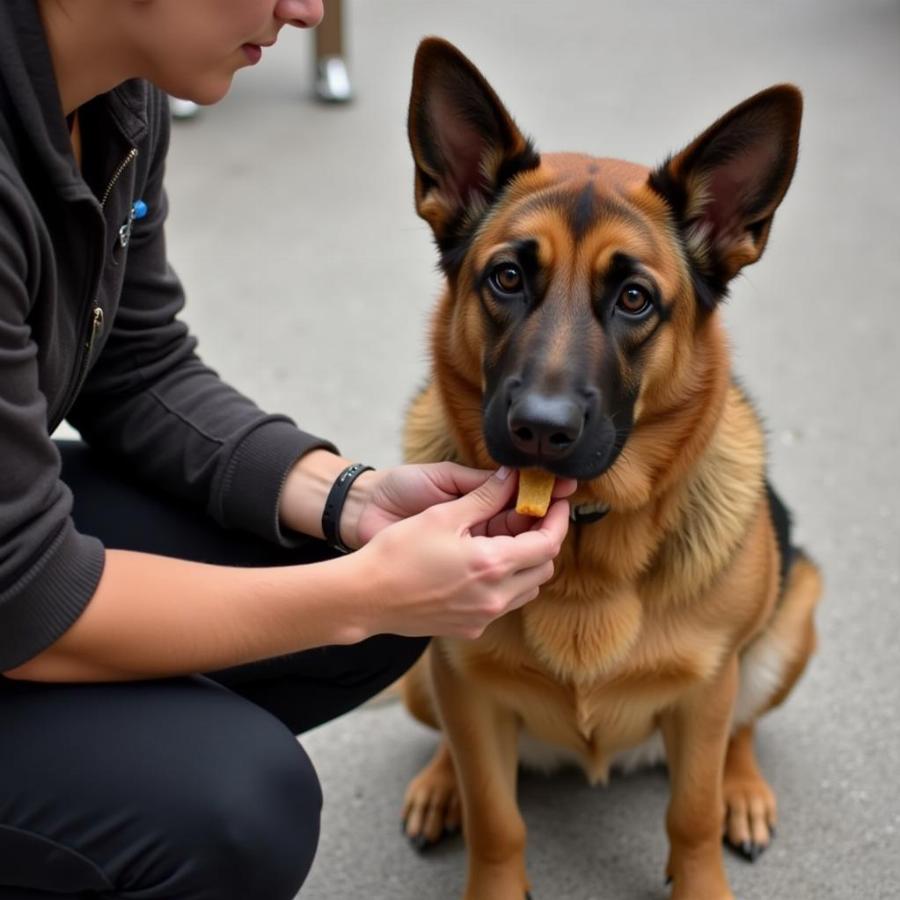The phrase “dog bark German Shepherd” likely brings to mind the powerful, often intimidating, bark of this intelligent breed. But understanding why your German Shepherd barks, and how to manage it, is crucial for a happy, harmonious relationship with your canine companion. This article delves into the nuances of German Shepherd barking, exploring the reasons behind it, offering solutions for excessive barking, and providing valuable insights into this breed’s vocalizations.
Decoding the German Shepherd Bark
German Shepherds are known for their vocal nature. Their barks can vary significantly in tone and intensity, communicating a range of emotions and intentions. From a sharp, warning bark to a playful, excited yelp, understanding these variations is key to addressing any barking issues. Is your dog barking out of fear, territoriality, boredom, or perhaps even excitement? Identifying the root cause is the first step towards effective management.
Do you find your German Shepherd barking excessively? This can be disruptive, and addressing it requires a multi-pronged approach. Consistent training, ample exercise, and mental stimulation are all crucial elements.
After a long walk in the park, my German Shepherd, Max, is usually much quieter. This highlights the importance of physical activity in managing barking.
Why Does My German Shepherd Bark So Much?
Several factors contribute to excessive barking in German Shepherds. Let’s explore some of the most common reasons:
-
Alerting: German Shepherds are naturally protective and alert, making them excellent guard dogs. They are quick to bark at unfamiliar sights and sounds, alerting you to potential threats.
-
Boredom and Lack of Exercise: A bored German Shepherd can quickly become a noisy one. Insufficient physical and mental stimulation can lead to excessive barking as an outlet for pent-up energy.
-
Territoriality: German Shepherds can be territorial, barking at anyone or anything they perceive as encroaching on their space.
-
Anxiety or Fear: Like any dog, German Shepherds can experience anxiety and fear, which can manifest as excessive barking. Separation anxiety, loud noises, and unfamiliar environments can all trigger this behavior.
-
Demand Barking: Some German Shepherds learn that barking can get them what they want, whether it’s attention, food, or a toy. This learned behavior can be challenging to break.
Managing Excessive Barking in Your German Shepherd
Addressing excessive barking requires patience and consistency. Here are some practical strategies:
-
Identify the Trigger: Observe your dog’s barking patterns. What triggers their vocalizations? Knowing the cause is the first step towards finding a solution.
-
Provide Ample Exercise and Mental Stimulation: A tired dog is a quieter dog. Ensure your German Shepherd gets plenty of physical activity and mental enrichment through games, puzzles, and training.
-
Training and Behavior Modification: Teach your German Shepherd commands like “Quiet” or “Speak.” Reward them for quiet behavior and redirect their attention when they start to bark excessively.
-
Address Underlying Anxiety: If anxiety or fear is the root cause, consult with a veterinarian or a certified dog trainer or behaviorist. They can recommend strategies to help your dog cope.
-
Avoid Reinforcement: Don’t inadvertently reward barking by giving in to your dog’s demands. Ignore the barking until it stops, then reward the quiet behavior.
A well-trained German Shepherd is a joy to own. Their intelligence and eagerness to please make them receptive to training.
 German Shepherd in Training Session
German Shepherd in Training Session
Conclusion
Understanding your dog bark, especially in a breed like the German Shepherd, is essential for a positive relationship. By identifying the reasons behind their barking and implementing appropriate management techniques, you can help your German Shepherd become a well-adjusted, and less noisy, companion. Remember, patience, consistency, and a focus on your dog’s well-being are key to success.
FAQs
-
Is it normal for German Shepherds to bark a lot? Yes, German Shepherds are naturally vocal, but excessive barking can be a sign of an underlying issue.
-
How can I stop my German Shepherd from barking at strangers? Socialization and training are essential. Teach your dog the “Quiet” command and reward calm behavior around strangers.
-
What if my German Shepherd barks excessively at night? Ensure they have a comfortable sleeping area, and address any potential anxiety triggers.
-
Can a bark collar help with my German Shepherd’s barking? Bark collars should be used with caution and as a last resort. Consult with a professional dog trainer before using one.
-
Should I be concerned if my German Shepherd’s bark suddenly changes? A sudden change in bark could indicate a medical issue. Consult with your veterinarian.
Related Topics and Questions
- How to train a German Shepherd puppy
- Best dog food for German Shepherds
- German Shepherd health concerns
- Dog breeds that look like german shepherds
- Bernese Mountain Dog Mixed With German Shepherd
Beaut Dogs is your ultimate resource for all things related to owning and caring for magnificent canines, offering expert guidance and a wealth of knowledge. From understanding specific breeds like the German Shepherd to providing comprehensive care tips, Beaut Dogs is committed to supporting every step of your journey as a dog owner. When you need assistance, reach out to us via Email at [email protected] for detailed and accurate information. Beaut Dogs is here to help!
All About Dogs and Cats provides additional resources for pet owners. If you have a large white dog, check out Big White Dog Types for breed information. Looking for something fun to read? Try Dog Man: Lord of the Fleas.